
Top Event Registration Form Templates for Easy Signups
Effortless Event Signups Start Here
Streamlining your event registration process is key to boosting attendance and creating a positive attendee experience. This comprehensive guide explores 12 versatile event registration form templates, each offering unique features and advantages. Whether you're organizing a small workshop or a large conference, you'll find the perfect tool to simplify sign-ups and manage attendee data efficiently. From industry giants like Eventbrite and Cvent to flexible options like Typeform and Jotform, we'll cover the strengths and weaknesses of each platform, providing practical insights based on real-world usage. This listicle helps solve the common problem of cumbersome registration processes by providing you with ready-to-use templates and integrations. We'll examine how these tools can help you:
- Capture essential attendee information
- Manage registration seamlessly
- Integrate with other marketing and event management tools
For those looking to streamline the entire event experience from start to finish, consider using professionally printed tickets. If you also need to print physical tickets, you can explore options at Event Tickets Printing. This resource from 4OVER4 provides various event ticket printing options. This list dives deep into the following event registration form templates:
- BuildForm
- Jotform
- Eventbrite
- 123FormBuilder
- SurveyMonkey
- Typeform
- HubSpot Form Builder
- Whova
- Eventzilla
- RSVPify
- Cvent
- vFairs
Ready to discover the perfect event registration form template for your needs? Let's get started.
1. BuildForm
BuildForm stands out as an AI-powered form builder designed to optimize lead capture and audience engagement. It allows users to create various conversational forms, from event registrations to surveys and job applications, without coding. The platform's DeepOptimize engine dynamically adjusts forms based on user behavior, boosting completion rates.
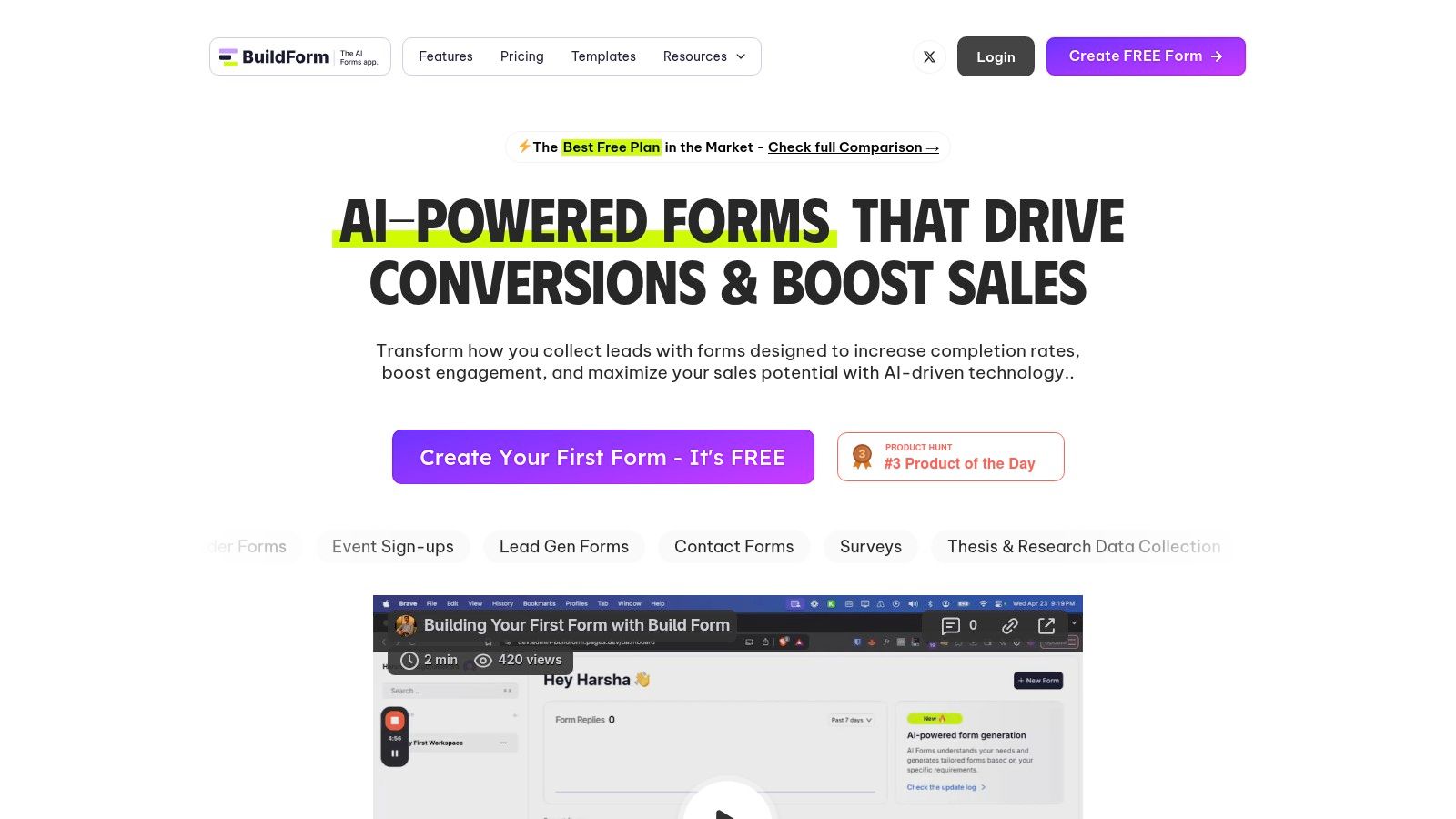
For event registration form templates, BuildForm offers several advantages. The AI-generated questions and conditional logic streamline the creation process. Integrations with tools like Slack, Notion, and Google Sheets simplify data management. Plus, partial submission tracking helps identify and address drop-off points. For event sign-ups, especially free ones, you might encounter temporary or disposable emails. Using disposable email checker tools can improve the quality of your registration data. Here are some top disposable email checker tools for 2025 from VerifyRight.
While BuildForm excels in its AI capabilities, there's a slight learning curve for beginners navigating the advanced features. Pricing for enterprise-level plans requires direct contact, lacking transparent on-site details.
Key Features and Benefits:
- AI-Powered Optimization: DeepOptimize adapts forms in real-time, minimizing drop-offs.
- No-Code Conversational Forms: Easily create engaging forms without any coding experience.
- Seamless Integrations: Streamline workflows with popular tools.
- Actionable Analytics: Track partial submissions and identify areas for improvement.
- High Reliability: 99.9% uptime guarantee ensures consistent performance.
Pros and Cons:
- Pros: Powerful AI optimization, no-code form creation, extensive integrations, detailed analytics, high reliability.
- Cons: Learning curve for advanced features, pricing details not readily available.
Website: https://buildform.ai
2. Jotform
Jotform provides a versatile online form building experience, offering over 750 event registration form templates. Its intuitive drag-and-drop interface makes customization easy, even without coding knowledge. From basic RSVP forms to complex multi-day conference registrations, Jotform offers a template to suit various event needs. This makes it a strong contender for event planners seeking quick, customizable solutions.
Jotform's extensive template library simplifies the initial setup. The platform's mobile-friendly design ensures accessibility for attendees registering on any device. Integration with over 100 apps, including PayPal and Google Sheets, streamlines payment processing and data management. Thinking about form design principles? Learn more about… Conditional logic enables dynamic form behavior based on user selections, creating personalized registration paths.
While Jotform's free plan is a great starting point, submission limits can be restrictive for larger events. Unlocking advanced features like custom branding and increased storage requires a paid subscription.
Key Features and Benefits:
- Vast Template Library: Choose from 750+ pre-built event registration templates.
- Drag-and-Drop Interface: Customize forms easily without coding.
- Mobile-Friendly Forms: Ensure accessibility across devices.
- Extensive Integrations: Connect with popular apps like PayPal and Google Sheets.
- Conditional Logic: Create dynamic forms based on user input.
Pros and Cons:
- Pros: User-friendly interface, high customization, robust integrations, free plan available.
- Cons: Free plan limitations, advanced features require paid subscription.
Website: https://www.jotform.com/form-templates/category/event-registration
3. Eventbrite
Eventbrite is a widely recognized event management and ticketing platform. It empowers users to create, promote, and sell tickets, complete with customizable event pages and integrated payment processing. Its popularity makes it a practical choice for reaching a broad audience. Eventbrite's robust suite of tools simplifies many aspects of event organization, from registration to post-event analysis.
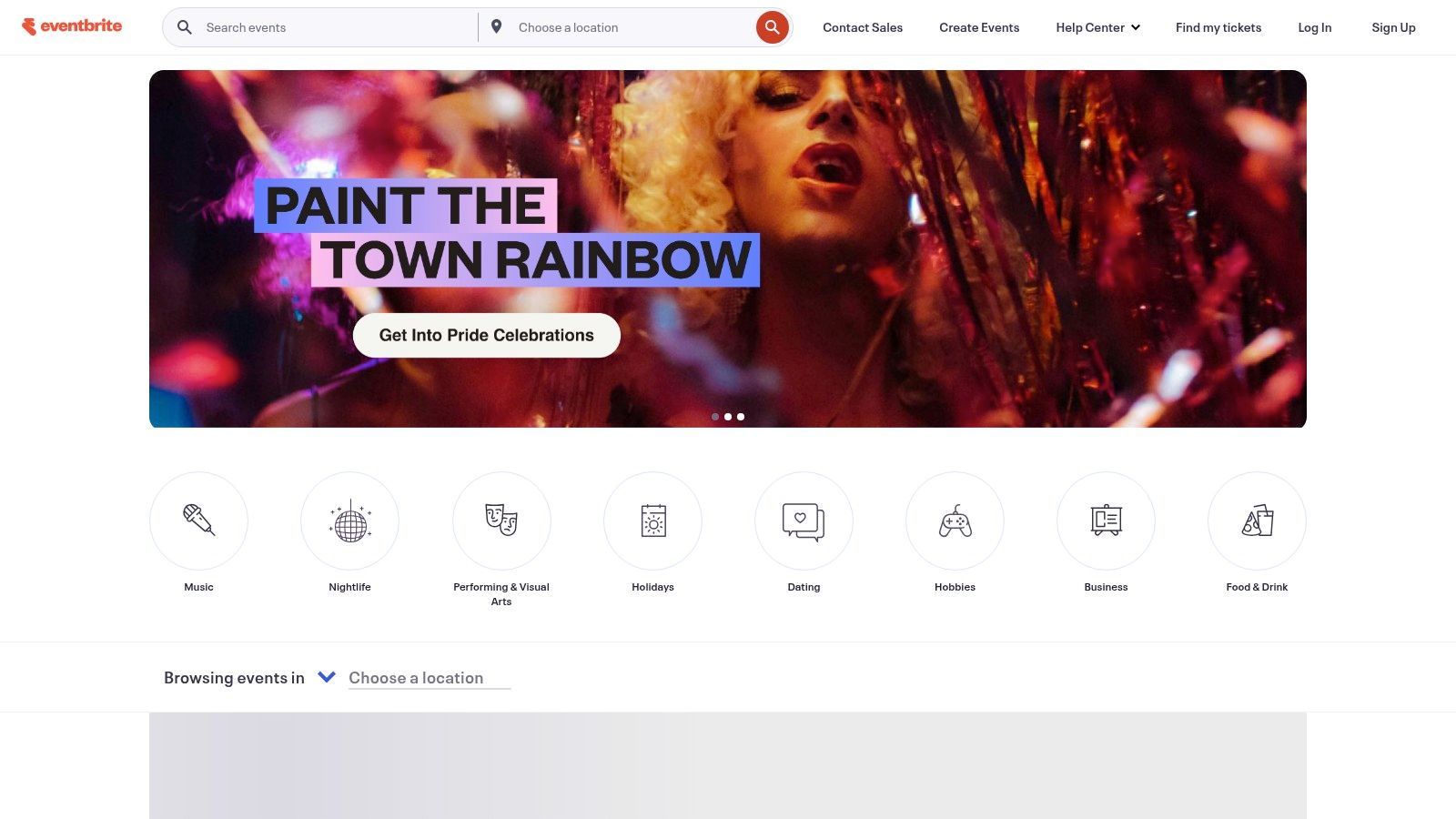
For event registration, Eventbrite offers pre-built templates and customizable options to gather attendee information. Its integrated payment processing streamlines ticket sales. The platform also provides promotional tools and email campaigns to maximize event visibility. You might want to Learn more about… setting up effective event registration forms on platforms like Eventbrite. Real-time analytics and reporting give valuable insights into attendee demographics and engagement.
While Eventbrite offers extensive features, its service fees for paid events can be substantial. Customization options for free events are somewhat limited compared to other platforms. Additionally, relying solely on Eventbrite's built-in promotional tools might not be sufficient for niche events requiring targeted outreach.
Key Features and Benefits:
- Customizable Event Pages: Tailor your event page to match your branding and event theme.
- Integrated Payment Processing: Simplify ticket sales with built-in payment gateways.
- Promotional Tools: Reach a wider audience with Eventbrite's marketing features.
- Real-time Analytics: Track key metrics and gain insights into attendee behavior.
- Mobile App: Manage your events on the go with Eventbrite's mobile app.
Pros and Cons:
- Pros: Easy setup, wide reach, comprehensive promotional tools, integrated payment processing.
- Cons: High service fees for paid events, limited customization for free events.
Website: https://www.eventbrite.com/
4. 123FormBuilder
123FormBuilder provides an intuitive platform for creating event registration form templates, boasting a vast library of pre-built options and extensive integrations. Its drag-and-drop interface makes form creation accessible even without coding knowledge. This makes it a solid choice for quickly setting up basic event registrations.
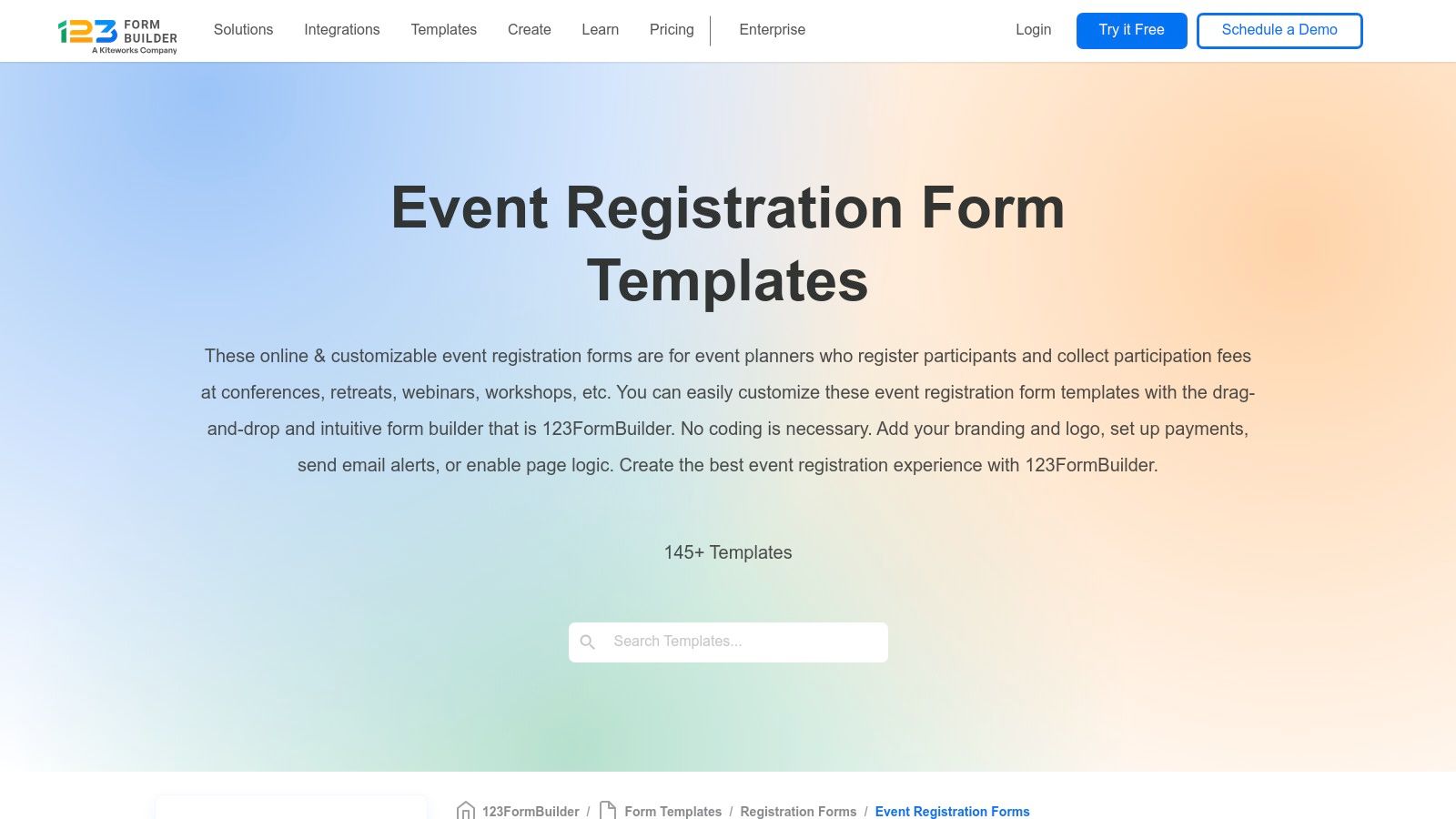
For streamlining event registration workflows, 123FormBuilder offers valuable features. Pre-built templates jumpstart the design process. Integration with over 4,000 tools allows for automated data transfer and workflow management. Conditional logic enables dynamic form behavior based on user input, personalizing the experience. Multilingual support caters to diverse audiences, expanding reach and accessibility.
While the free plan offers basic functionality, unlocking advanced features like payment integrations or data export requires a paid subscription. The sheer number of integrations, while beneficial, can also feel overwhelming for users seeking simple solutions.
Key Features and Benefits:
- Drag-and-Drop Interface: Easily create forms without any coding skills.
- Customizable Templates: Over 3,000 templates provide a strong starting point.
- Extensive Integrations: Connect with a vast network of digital tools.
- Conditional Logic: Implement dynamic form behavior based on user input.
- Multi-Language Support: Create forms accessible to a global audience.
Pros and Cons:
- Pros: No coding required, wide integration options, responsive customer support.
- Cons: Limited features on the free plan, advanced features require paid subscriptions.
Website: https://www.123formbuilder.com/free-form-templates/gallery-registration/event-forms/
5. SurveyMonkey
SurveyMonkey, renowned for its robust survey capabilities, extends its functionality to event registration with dedicated form templates. These templates simplify the process of gathering RSVPs and essential attendee information. This makes it a practical choice for various event types, from webinars to conferences.
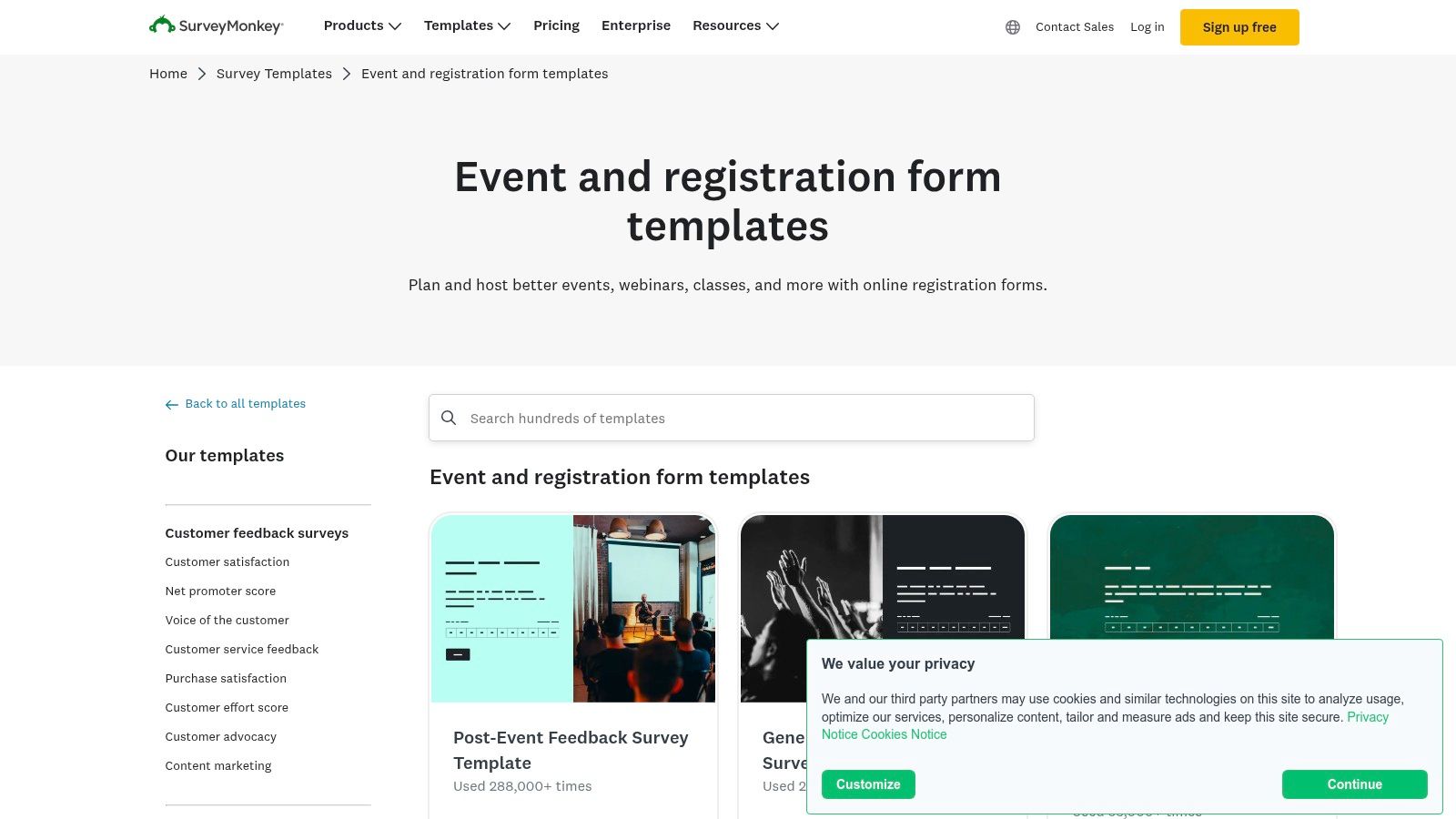
For event registration form templates, SurveyMonkey shines in its ease of use and customization. While the platform is powerful, even users with limited technical experience can create and deploy professional-looking forms quickly. The advanced logic and branching features allow for personalized attendee journeys based on their responses. This can be particularly useful for gathering specific dietary requirements or workshop preferences.
While the free plan provides a solid foundation, unlocking the full potential of SurveyMonkey requires a paid subscription. Advanced features like custom branding, data export, and integration with marketing automation tools reside within the paid tiers. Consider the scope and requirements of your event when choosing a plan.
Key Features and Benefits:
- Customizable Templates: Adapt pre-built templates to match your event branding and data needs.
- Advanced Logic & Branching: Create dynamic forms that personalize the attendee experience.
- Real-Time Analytics: Track responses and gain insights into attendee demographics and preferences.
- App Integrations: Connect with tools like Salesforce and Marketo for streamlined data management.
- Mobile-Friendly Forms: Ensure accessibility for attendees registering on any device.
Pros and Cons:
- Pros: Easy to use and customize, strong analytics and reporting tools, wide range of integrations.
- Cons: Free plan has limited features, advanced features require a paid subscription.
Website: https://www.surveymonkey.com/categories/templates/event-registration-forms/
6. Typeform
Typeform excels at creating engaging and interactive event registration form templates. Its conversational interface makes form completion feel less like a chore and more like a dialogue. This approach boosts completion rates and gathers richer data. The platform offers a variety of customizable templates specifically designed for events, from webinars to conferences.
Typeform’s strength lies in its user-friendly interface. Building and customizing forms is intuitive, even without coding experience. You can tailor the look and feel to match your event branding. Integrations with popular marketing automation and CRM tools streamline data management and follow-up communication.
Key Features and Benefits:
- Conversational Interface: Transforms traditional forms into engaging dialogues.
- Customizable Templates: Provides a starting point for various event types.
- Seamless Integrations: Connects with marketing and CRM tools for automated workflows.
- Data Analysis and Reporting: Offers insights into registration trends and attendee demographics.
- Mobile-Responsive Design: Ensures optimal viewing on any device.
Pros and Cons:
- Pros: Highly engaging user experience, easy customization, strong integrations, valuable data insights.
- Cons: Limited responses per month on the free plan, some users may prefer traditional form layouts.
Website: https://www.typeform.com/templates/sub-category/event-forms/
7. HubSpot Form Builder
HubSpot's Form Builder stands out for its seamless integration with the HubSpot CRM, making it a powerful tool for streamlining event registration and lead capture. It simplifies the process of creating event registration forms, automatically syncing data with your HubSpot contacts. This eliminates manual data entry and provides valuable insights into attendee behavior.
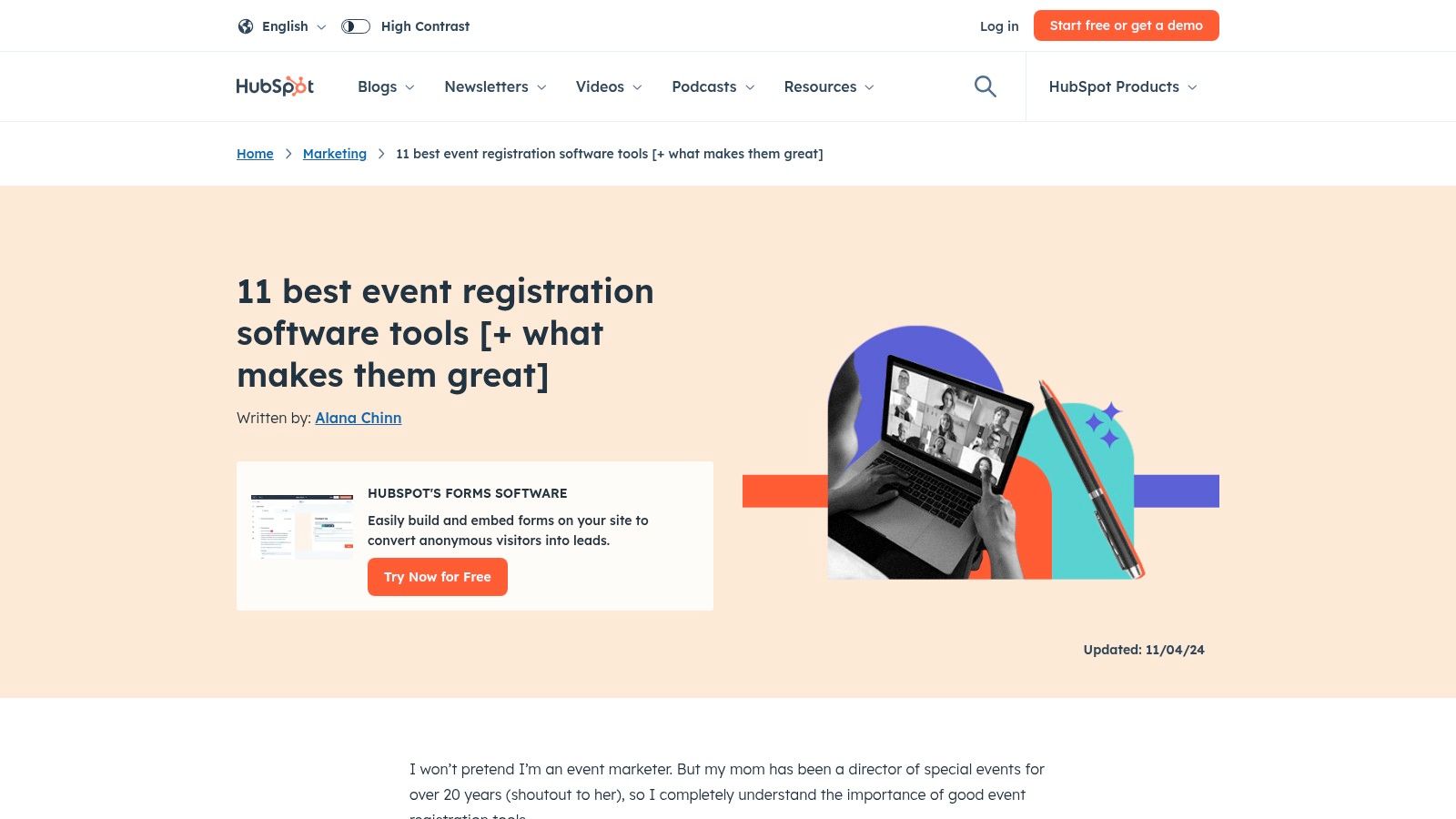
For event registration form templates, HubSpot offers a user-friendly drag-and-drop interface. This allows for easy customization of form fields, including conditional logic for a more personalized registration experience. The real-time analytics dashboard provides immediate feedback on form performance, enabling quick adjustments for optimal conversion rates. While the free version provides a solid foundation, leveraging the advanced features, like progressive profiling, requires a paid HubSpot Marketing Hub subscription.
Key Features and Benefits:
- Drag-and-Drop Interface: Easily build forms without any coding knowledge.
- HubSpot CRM Integration: Automatically sync registration data with your CRM.
- Customizable Form Fields: Tailor forms to specific event needs.
- Conditional Logic: Create dynamic forms that adapt to user input.
- Real-time Analytics: Track form performance and identify areas for improvement.
Pros and Cons:
- Pros: Seamless HubSpot integration, user-friendly interface, free core features.
- Cons: Limited advanced features on the free plan, full potential requires paid HubSpot subscription.
Website: https://blog.hubspot.com/marketing/event-registration-tool
8. Whova
Whova offers a comprehensive event management platform that includes robust registration form capabilities. It caters to in-person, virtual, and hybrid events, simplifying the process from sign-up to post-event engagement. Beyond basic forms, Whova allows for customized branding, ticket tiers, and automated email communications.
For event planners juggling multiple tasks, Whova's centralized system streamlines attendee management. The platform’s user-friendly interface simplifies registration form creation, even for complex events. Features like attendee networking, agenda building, and real-time analytics add significant value beyond just registration.
While Whova excels in its comprehensive approach, it might be overkill for smaller, simpler events. The lack of publicly available pricing requires direct contact, which can be inconvenient for budget-conscious organizers. For larger events requiring advanced features and attendee engagement tools, however, Whova provides a powerful solution.
Key Features and Benefits:
- Customizable Registration Forms: Tailored forms for different event types and ticket options.
- Integrated Event Website Builder: Create a seamless online presence for your event.
- Attendee Engagement Tools: Foster networking and interaction among participants.
- Real-time Analytics: Track registration data and event performance.
- Mobile App: Manage events and engage with attendees on the go.
Pros and Cons:
- Pros: Comprehensive event management, user-friendly interface, strong attendee engagement tools.
- Cons: Pricing not readily available, potentially excessive for simple events.
Website: https://whova.com/blog/event-registration-forms-and-templates/
9. Eventzilla
Eventzilla stands out as a comprehensive event management platform, automating processes from registration to post-event follow-up. It caters to various event formats: virtual, hybrid, and in-person. The platform offers customizable registration forms and integrates with over 1,000 apps via Zapier, facilitating streamlined workflows.
For event registration form templates, Eventzilla provides a practical solution. Its customizable registration pages allow tailored branding and data collection. The integration with email marketing tools automates communication with attendees. Real-time analytics offer valuable insights into registration trends and participant demographics. The mobile app facilitates on-the-go event management, useful for busy organizers. For free events, consider pairing Eventzilla with a disposable email checker to ensure data quality.
While Eventzilla offers a robust feature set, the per-registration fees can accumulate, especially for large-scale events. Some of the more advanced features might require a learning curve for new users.
Key Features and Benefits:
- Customizable Registration Pages: Tailor forms to match event branding and specific data requirements.
- Extensive Integrations: Connect with numerous apps via Zapier to automate workflows.
- Email Marketing Tools: Simplify communication with attendees through automated campaigns.
- Real-time Analytics: Gain insights into registration trends and demographics.
- Mobile App: Manage events on-the-go, offering flexibility and convenience.
Pros and Cons:
- Pros: Comprehensive features, flexible pricing options, supports various event types.
- Cons: Per-registration fees can add up, some features may have a learning curve.
Website: https://www.eventzilla.net/
10. RSVPify
RSVPify stands out as a user-friendly online RSVP and event management platform. It offers customizable registration forms and event pages suitable for both personal and professional events. From weddings and birthdays to conferences and webinars, RSVPify simplifies the process of gathering guest information and managing event logistics. Its intuitive interface makes it accessible even for those without technical expertise.
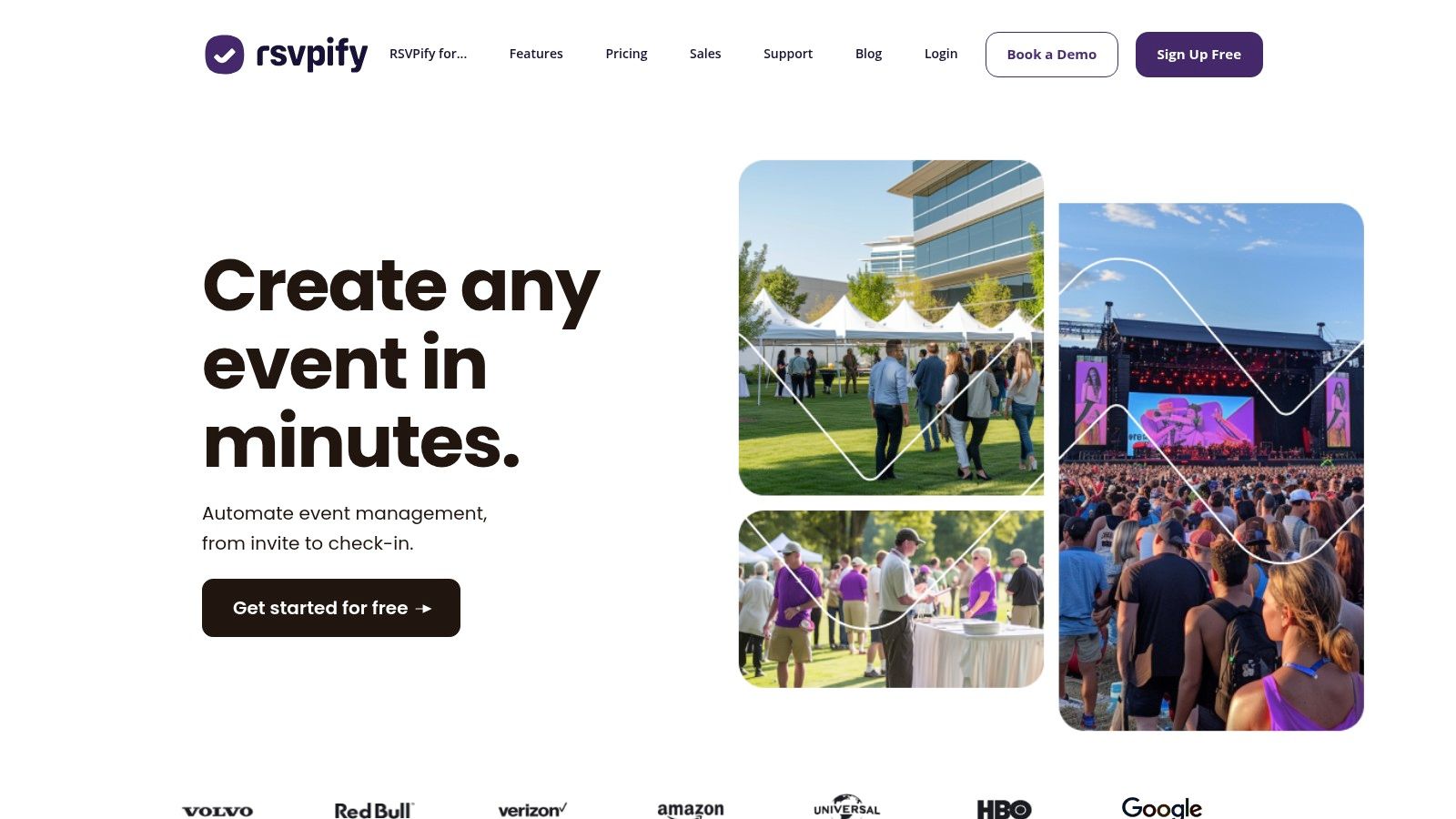
For creating event registration form templates, RSVPify offers robust customization options. You can tailor questions, branding, and the overall design to match your event's theme. The platform's guest list management features and seating chart creator simplify complex event organization. Embeddable forms further enhance flexibility by allowing seamless integration with your existing website. Integrating RSVPify with a reliable disposable email checker will enhance the quality of registration data. This helps in filtering out temporary emails often used for free event sign-ups. This ensures accurate communication with attendees.
While the free plan is a great starting point, the 100 RSVP limit can be restrictive for larger events. Unlocking advanced features like custom domain mapping requires a paid subscription. However, the intuitive design and robust features make it a valuable tool for streamlining event registrations.
Key Features and Benefits:
- Customizable Event Pages: Tailor your event page to reflect your brand and event theme.
- Seating Chart Creator: Simplify seating arrangements for complex events.
- Guest List Management: Easily track RSVPs and manage guest information.
- Embeddable Forms: Integrate registration forms directly into your website.
- Data Analytics: Gain insights into attendee demographics and responses.
Pros and Cons:
- Pros: User-friendly interface, extensive customization, free plan available, robust features.
- Cons: Free plan limitations, advanced features require paid subscription.
Website: https://rsvpify.com/
11. Cvent
Cvent is a comprehensive event management platform known for its robust registration features. It's particularly well-suited for large-scale events, conferences, and webinars requiring sophisticated registration workflows. From custom branding to complex ticketing options, Cvent offers a powerful suite of tools to manage attendee data and streamline the registration process.
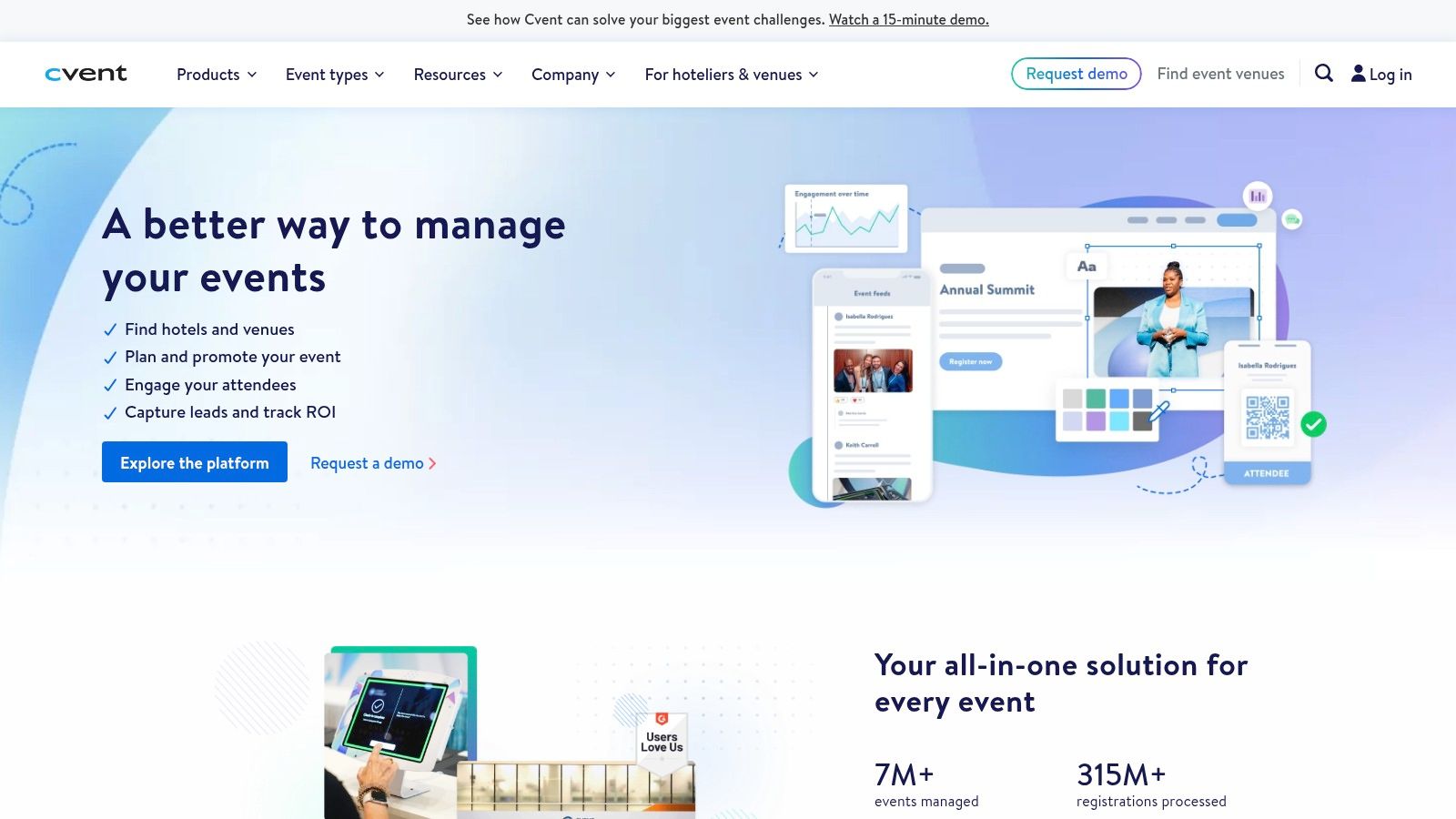
For event registration form templates, Cvent provides extensive customization options. You can tailor forms to match your event branding, collect specific attendee information, and integrate payment gateways seamlessly. The platform's reporting and analytics capabilities offer valuable insights into registration trends, allowing organizers to optimize their event strategies. While Cvent is ideal for larger events, its extensive features may be overkill for smaller gatherings.
Key Features and Benefits:
- Customizable Registration Forms: Create branded forms tailored to your event needs.
- Event Marketing Tools: Promote your event and manage attendee communication.
- Onsite Solutions: Facilitate seamless check-in and badge printing.
- Real-time Reporting and Analytics: Track registration data and identify key trends.
- Mobile Event App: Enhance attendee engagement with a dedicated mobile app.
Pros and Cons:
- Pros: Comprehensive feature set, suitable for large events, strong support and resources.
- Cons: Pricing information not publicly available, may be complex for smaller events.
Website: https://www.cvent.com/
12. vFairs
vFairs positions itself as a comprehensive platform for virtual and hybrid events, offering robust registration tools alongside immersive event experiences. This makes it a compelling choice for organizers looking to streamline the entire event lifecycle, from sign-up to post-event engagement. It's particularly well-suited for large-scale events, conferences, and trade shows where a cohesive online experience is crucial.
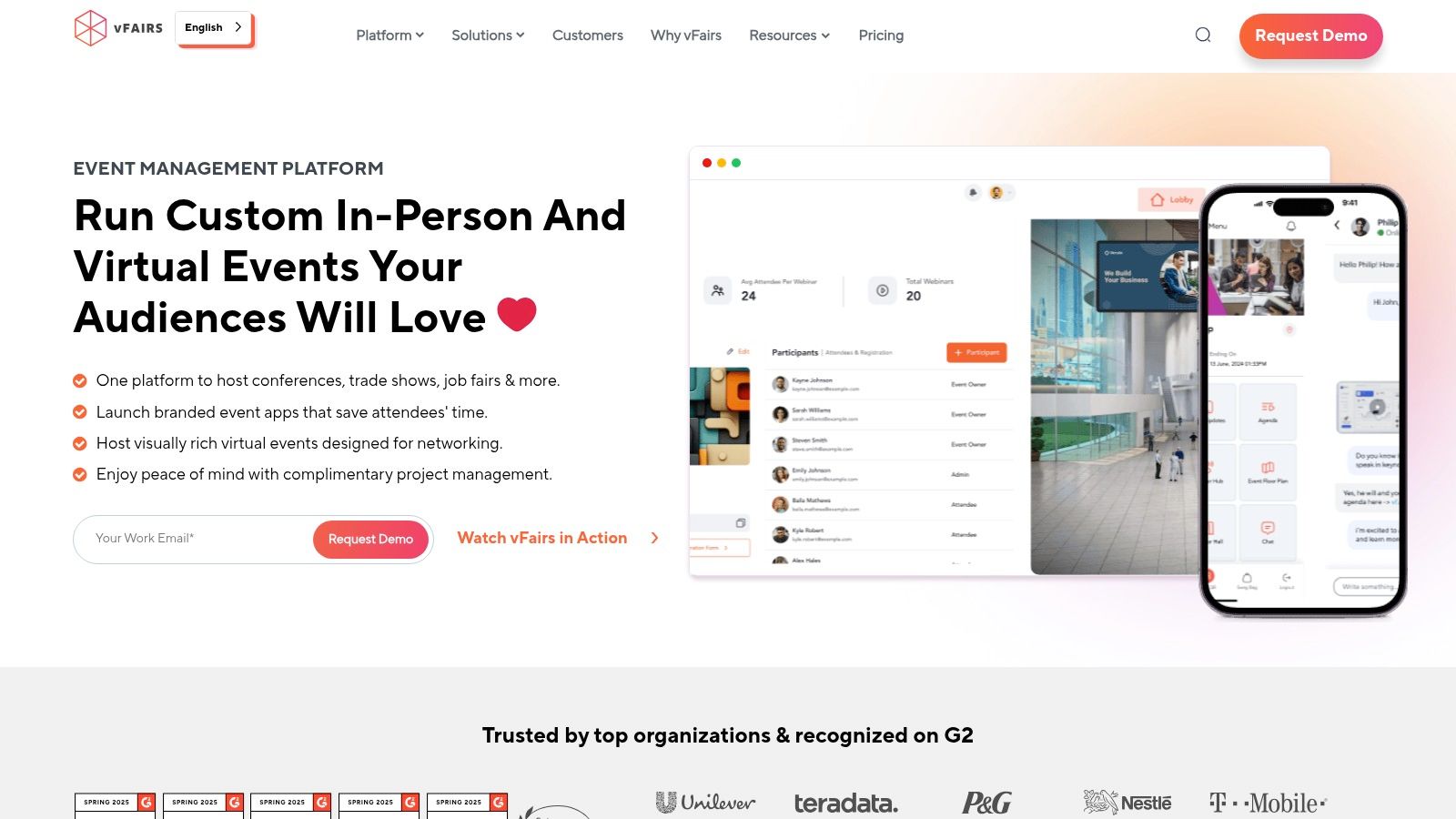
For event registration form templates, vFairs offers highly customizable forms. These forms integrate seamlessly into the virtual environment. This creates a unified branding and user experience. Features like automated email reminders and attendee management tools further enhance the registration process. While vFairs shines in its comprehensive approach, the platform might be overkill for smaller, simpler events.
Key Features and Benefits:
- Customizable Registration Forms: Tailor forms to specific event needs, including branding and data collection requirements.
- Integrated Virtual Environment: Seamless transition from registration to the actual event platform.
- Networking & Engagement Tools: Facilitate interactions between attendees and exhibitors within the virtual space.
- Real-Time Analytics: Track registration data, attendee engagement, and other key metrics.
- Robust Customer Support: Dedicated assistance for navigating the platform and maximizing its features.
Pros and Cons:
- Pros: Immersive virtual event experiences, comprehensive feature set, strong customer support, customizable registration.
- Cons: Pricing information not readily available, potentially more complex than needed for simple events.
Website: https://www.vfairs.com/
Event Registration Form Templates Comparison
| Platform | Core Features / Highlights | User Experience / Quality | Value Proposition | Target Audience | Price Points / Plans |
|---|---|---|---|---|---|
| 🏆 BuildForm | AI-powered DeepOptimize engine ✨, unlimited conversational forms, AI-generated questions | ★★★★★ 4.98, real-time adaptive forms | Generous free plan 💰, scales solo to enterprise | 👥 Freelancers, Marketers, HR, Researchers | Flexible, contact for enterprise 💰 |
| Jotform | 750+ templates, drag-and-drop, conditional logic | ★★★★☆, user-friendly | Free plan with limits 💰, strong integrations | 👥 Event planners, SMBs | Free & paid tiers 💰 |
| Eventbrite | Event pages, ticketing, payment processing | ★★★★☆, easy setup | Free for free events, fees for paid 💰 | 👥 Event organizers, promoters | Fees per ticket sold 💰 |
| 123FormBuilder | 3,000+ templates, drag-and-drop, multi-language support | ★★★★☆, responsive support | Limited free plan 💰, wide integrations | 👥 SMBs, global users | Free & paid plans 💰 |
| SurveyMonkey | Advanced survey logic, real-time analytics | ★★★★☆, strong reporting | Limited free plan 💰, paid for advanced | 👥 Researchers, marketers | Free & paid tiers 💰 |
| Typeform | Conversational forms ✨, customizable templates | ★★★★☆, highly engaging UX | Limited free responses 💰 | 👥 Creatives, marketers | Free & paid plans 💰 |
| HubSpot Form Builder | Drag-and-drop, CRM integration | ★★★★☆ seamless CRM | Free 💰, limited features without paid plans | 👥 HubSpot users, marketers | Free with paid upgrades 💰 |
| Whova | Event website, engagement tools | ★★★★☆ comprehensive tools | Pricing not public 💰 | 👥 Corporate & hybrid events | Contact for pricing 💰 |
| Eventzilla | Registration, email marketing, mobile app | ★★★★☆ flexible, feature-rich | Flexible pricing 💰, per-registration fees | 👥 Various event types | Paid plans + fees 💰 |
| RSVPify | Custom event pages, guest management | ★★★★☆ user-friendly | Free plan limited 💰 | 👥 Personal & professional events | Free & paid plans 💰 |
| Cvent | Comprehensive event mgmt, onsite tools | ★★★★☆ robust support | Pricing not public 💰 | 👥 Large scale events | Contact for pricing 💰 |
| vFairs | Virtual event environments, networking tools | ★★★★☆ immersive experiences | Pricing not public 💰 | 👥 Virtual/hybrid event hosts | Contact for pricing 💰 |
Choosing the Perfect Event Registration Form Template
Finding the right event registration form template can feel overwhelming with so many options available. This article explored twelve popular tools, each with its own strengths and weaknesses. From simple form builders like Jotform and 123FormBuilder to comprehensive event management platforms like Cvent and vFairs, the variety caters to diverse needs and budgets. Remember, the "perfect" template isn't universally defined; it's the one that best aligns with your specific requirements.
Key Takeaways and Considerations
Several crucial factors emerged when reviewing these event registration form templates:
- Simplicity vs. Functionality: Tools like Typeform excel in user experience with visually appealing designs, while others like Eventbrite and Whova prioritize robust event management features.
- Integration Capabilities: Seamless integration with your existing marketing automation, CRM, or email marketing tools is essential for streamlining workflows. HubSpot Form Builder and 123FormBuilder, for example, offer extensive integration options.
- Scalability: Consider your event's growth potential. Solutions like Eventzilla and RSVPify are designed for varying event sizes, ensuring your registration process can adapt.
- Budgetary Constraints: Free options like Google Forms (not covered in this article) or freemium models like Jotform can be great starting points, while premium platforms like Cvent offer advanced functionalities at a higher cost.
Implementing Your Chosen Template
After selecting your ideal event registration form template, successful implementation hinges on a few key steps:
- Clearly Defined Objectives: Understand your data collection needs. What information is essential, and what is optional? This clarity will inform your form design.
- User-Friendly Design: A cluttered form can deter registrations. Prioritize a clean layout, concise questions, and mobile responsiveness. Tools like Typeform and BuildForm are particularly strong in this area.
- Thorough Testing: Before launching, rigorously test your form to ensure all functionalities work as expected and the registration flow is seamless.
- Post-Event Analysis: Review your form's performance after the event. Identify areas for improvement, such as completion rates and drop-off points. SurveyMonkey and some other platforms offer valuable analytics for this purpose.
Making the Right Choice
Choosing the right event registration form template boils down to understanding your event's unique needs.
- Small events with basic requirements: Jotform, 123FormBuilder, or Google Forms might suffice.
- Larger events needing robust features: Eventbrite, Whova, Eventzilla, or Cvent would be more appropriate.
- Visually engaging forms with a focus on user experience: Consider Typeform or BuildForm.
- Deep integration with existing marketing tools: HubSpot Form Builder or 123FormBuilder are excellent options.
No matter the size or scope of your event, leveraging the power of an effective registration form template can significantly impact your success. A streamlined process, coupled with valuable data insights, empowers you to create memorable and impactful events.
Looking for a powerful yet intuitive way to build custom event registration forms? BuildForm lets you create stunning, AI-powered forms that integrate seamlessly with your existing workflows. Visit BuildForm today to discover how it can transform your event registration process.


